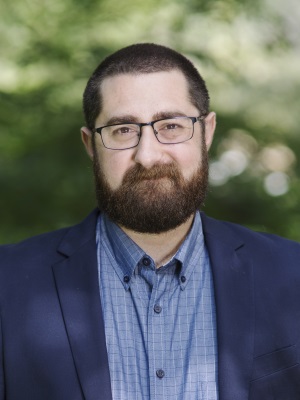Workforce Development: Investing in the next generation of social workers, health care workers and our community
Over the past decade, the Wayne State University School of Social Work has become the state’s collegiate hub for large-scale training programs supporting workforce development efforts in child welfare and substance use. Learn more about the current grant-funded initiatives that offer unique opportunities for Wayne State students across a variety of academic programs to better serve the community.
Child welfare training initiative

Future child welfare workers will soon be eligible to receive up to $5,000 per semester in stipends, along with dedicated mentorship and child welfare training opportunities. This is part of a child welfare training initiative recently authorized by the State of Michigan that will soon launch at several of the state’s public universities, including the Wayne State University School of Social Work. Funding for the initiative comes from Title IV-E, a federal program that helps states pay for the costs of operating their child welfare systems and training the workforce.
“Social workers bring an important perspective and skill set to child welfare practice, focusing on family strengths and prioritizing family preservation alongside child safety,” said Assistant Professor Bryan Victor. “We also want a child welfare workforce that reflects the local community, and as Detroit’s School of Social Work, it is important that Wayne State take an active role in training and support the next generation of child welfare leaders.”
In exchange for their stipends, students will commit to six months of work in a child welfare agency for each semester they receive a stipend, following their graduation.
Increasing school social workers

School social workers play a vital role in student success — both in and out of the classroom. Not only are students 21 times more likely to visit their school social worker for treatment than anywhere else, but schools that employ mental health providers also see improved attendance rates, academic achievement, career preparation and graduation rates, and lower instances of suspension or other disciplinary incidents.
Although these statistics are compelling, Michigan’s students are still not receiving the emotional, social and behavioral support they need due to a lack of school and educational social workers — but a Mental Health Service Professional Demonstration Grant received by the Michigan Department of Education may help bolster the workforce. As part of the program, as many as 11 Wayne State M.S.W. students will each receive up to $20,000 to cover tuition and other educational costs if they fulfill the program requirements.
“M.S.W./second-year students need to agree to do an internship in a high-need school in Wayne County that is part of the Wayne Regional Educational Service Agency. They must also commit to working with these schools post-graduation for a minimum of one year,” said Anwar Najor-Durack, assistant professor and assistant dean for student affairs. The ultimate goal of this initiative is to hire at least half of the graduate trainees as mental health services providers after they complete their year-long internship. Another objective is to place graduate trainees who come from diverse backgrounds or communities served by high-need local educational agencies. Barriers for diverse students include greater financial need, lack of inclusivity, exposure to microaggression and less social support. Learn more
Additionally, the School of Social Work currently offers a path to obtain temporary approval by the state Department of Education, which is required for employment as a school social worker, and a School Social Worker Refresher course for those who do not yet have full approval or would like to return to school social work after a break in the profession. For more information on temporary approval, visit our website or contact temporary approval coordinator Karen Weiner at ah9301@wayne.edu. View additional information on the refresher course.
Crisis Intervention Credentialing Program

With the support of a $1.65 million state appropriation to Wayne State via state legislators, the School of Social Work (SSW) has been working to develop a crisis response skill-building program for the state. The Crisis Intervention Credentialing Program is the result of a team effort, under the leadership of Dean Sheryl Kubiak and Professor Amy Watson, and with our colleagues at the Michigan Department of Health and Human Services. Assistant Professor and Director of the SSW Office of Continuing Education Shantalea Johns is bringing the five-year project to life. The mission of the program is to prepare mental health professionals and paraprofessionals to act as crisis responders in a variety of settings, often collaborating with law enforcement.
This behavioral health workforce will be trained for these new jobs with a goal of increasing public safety, as well as the wellbeing of the individual in crisis. The program will begin accepting students through a continuing education mechanism and credit-based WSU classes in 2024. “The program will be open to all undergraduate and graduate students — as well as alumni of WSU and other degree programs — who are interested in behavioral health crisis intervention. They do not have to be pursuing a social work degree but will need to be seeking a degree in a social or behavioral health area,” said Johns. Learn more
Those interested in learning more about the program should contact the SSW Continuing Education Office at ce_ssw@wayne.edu to be added to a mailing list for future communications.
Early intervention for substance use disorders

In 2015, the federal government gave Wayne State University nearly $1 million to train social work and nursing students to assess patients in primary care settings for substance use behaviors.
Feleta Wilson, an associate professor and Fulbright Scholar in the College of Nursing who passed away in 2019, and Anwar Najor-Durack, assistant professor and assistant dean for student affairs, along with Umeika Stephens, an assistant professor (clinical) of nursing, who joined Najor-Durack when Wilson stepped down for health reasons, used the three-year grant from the U.S. Substance Abuse and Mental Health Services Administration to train more than 800 students and professionals in Screening Brief Intervention Referral to Treatment (SBIRT), an integrated, public health approach to delivering early intervention and treatment services for people with — or at risk of developing — substance use disorders.
SBIRT is designed for use in primary care centers, hospital emergency rooms, trauma centers and other community settings that are a person’s first, and sometimes only, contact with the health care system. According to Najor-Durack, training social workers and nurses in SBIRT makes sense because they typically spend the most time with patients, overseeing intakes, discharges and referrals. They also share a more holistic approach to assessing patients.
“Social workers and nurses consider how physical, behavioral and environmental circumstances come together to influence health and well-being and can direct patients toward community-based resources to improve their outcomes,” said Najor-Durack. Learn more
Behavioral health workforce training

Since 2018, the Trauma Informed Integrated Healthcare-Behavioral Health Workforce Education and Training Grant (BHWET) has worked to develop and enhance the behavioral health workforce by advancing nursing, social work and psychology education and clinical practice through the provision of culturally competent, enhanced interprofessional education in integrated health-care settings.
The training has a targeted focus on children, adolescents and transitional age youth at risk for developing or who have developed a recognized behavioral health disorder and are located in a medically underserved community. This group was selected because “research has shown that children and youth living in poverty and medically underserved communities have lower rates of access to treatment and medical care,” said Professor of Social Work Suzanne Brown, who serves as the grant’s principal investigator. “Early diagnosis and appropriate treatment for children and youth impact the kind of lives they live and adults they become. BHWET provides us with the opportunity to work with allied health professionals to create a support network of care for our fellow Detroiters facing these hurdles.”
BWHET’s initial impact was bolstered by an additional $1.92 million in grant funding from the Health and Human Services Administration, which is being used to train 100 additional graduate students from nursing, social work and psychology, and more than 80 community-based health care professionals in integrated health care settings. Learn more
Community-focused behavioral health education and practice
Led by principal investigator and Assistant Professor (Cinical) Umeika Stephens from the College of Nursing and Social Work co-investigators Assistant Professor and Assistant Dean for Student Affairs Anwar Najor-Durack and Professor Bridget Weller a $1 million HRSA grant will support the project “Wayne State University Community-focused Interdisciplinary Trauma-Informed Youth Collaborative (CITY-C) to Address Behavioral Health Disorders among Children, Adolescents and Transitional-Age Youth.” The project aims to develop and enhance the behavioral health workforce while advancing nursing, social work and clinical practice through the provision of culturally competent, enhanced interprofessional education. The project will be focused on providers working with children, adolescents and transitional-age youth at risk for developing, or who have developed, a recognized behavioral health disorder, in the community setting.
The funding will also support the training of nursing and social work graduate students, community-based health care professionals, clinical supervisors, preceptors, and faculty. Learn more
The Detroit Tri-County Social Work Health Career Opportunity Academy

Professor Bridget Weller has obtained funding for the Detroit Tri-County Social Work Health Career Opportunity Academy, which supports the matriculation, retention and graduation of community college and university students from economically or educationally disadvantaged backgrounds who seek to pursue health care careers.
This program provides tailored academic, economic and social support to community college allied health and bachelor of social work students while simultaneously training community-based experiential health professionals. Additionally, participating students qualify for $4,200 in stipends and scholarships.
By the end of the structured programs, students will be able to use evidence-based study strategies for academic success; describe the influence of health disparities, social determinants of health, and health equity on healthcare outcomes; and demonstrate awareness of careers in social work healthcare and the importance of research in providing healthcare. Learn more